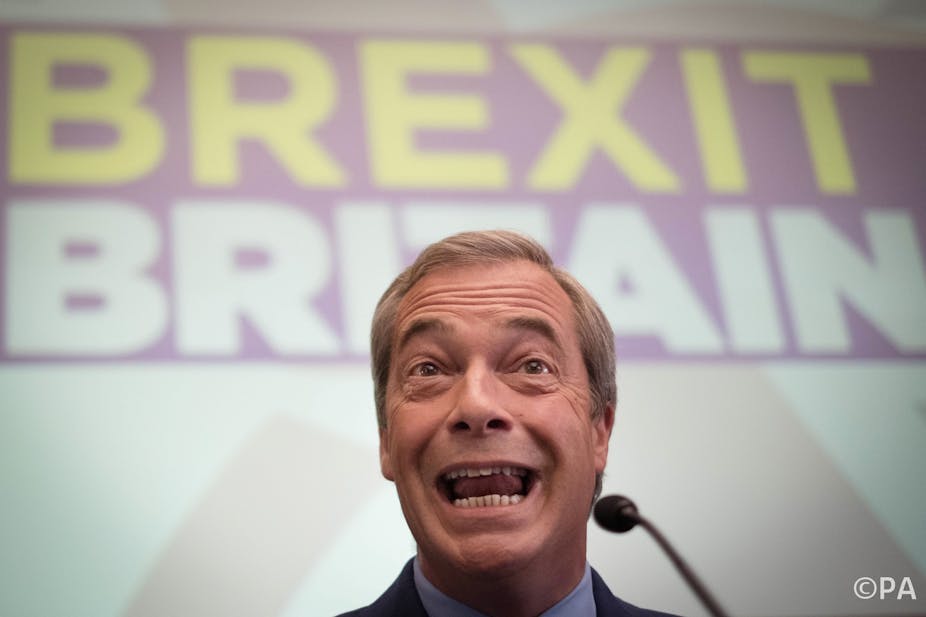Nigel Farage’s decision to resign as leader of the UK Independence Party (UKIP) is the latest instalment in the post-Brexit politics of Britain. Major developments occur on a daily basis at the moment. But unlike David Cameron’s resignation, Boris Johnson’s abandoned leadership challenge or Michael Gove’s implosion, Farage’s departure appears more as a surprise and less of a shock.
A new era in British politics beckons and the leading figures of the old era are busy departing the scene. Having achieved the goal of winning the referendum, Farage now says that he “wants his life back”.
This move makes sense. The end of the referendum campaign has brought to a close a period filled with drama and controversy. Farage’s departure removes a divisive figure from the front line of the post-referendum scene.
Unity is now sorely needed. It will be for a new prime minister and possibly a new leader of the opposition to build that unity but the changing of the political guard will now include UKIP too.
Unity is also somewhat lacking within the party. Not all UKIP members were delighted to see Farage perform a u-turn on his promised resignation after failing to win a parliamentary seat in the 2015 general election. Pressure might have eventually built up again after the referendum. Rather than risk staying on too long and facing a forced departure, Farage has left on his own terms, with the cheers of his party ringing in his ears.
There may be other considerations too. The fact that UKIP is going to achieve its founding aim of taking the UK out of the EU is not to say that the party will simply pack up and go away. There is an opportunity for it to rebrand itself – a process partly underway already – as a European-style radical-right party, perhaps in the mould of the Danish People’s Party or, to a lesser extent, the French Front National.
These parties generally campaign on the issue of immigration and appeal to “left behind” working-class voters for support. The referendum campaign and result indicated that such an electoral constituency can be mobilised around this issue in Britain.
The crisis in the Labour Party, and the very real fear that its northern English heartlands are at risk, gives UKIP a chance to stake a claim for those left-behind voters. It was open to question whether Farage was the best person to front such a campaign. UKIP could now choose a leader that reflects this reorientation. Current deputy leader, Paul Nuttall, is an obvious choice. The new leader may be eyeing an opportunity for UKIP to become a bigger presence in the House of Commons as the post-Brexit fallout continues.
Triumph or tragedy?
Farage’s legacy will inevitably be viewed in two contrasting ways, depending on your political position – or even on where you stood on the referendum.
For some, he embodies much of what is wrong with modern politics. They see him as the man who made anti-immigrant sentiment acceptable, playing to the darker instincts of voters. His legacy is the destruction of Britain’s EU membership and the start of a retreat to Little England.
For others, he is one of the most successful British politicians of the post-war era. Few issues (other than perhaps going to war) are as important as Britain’s constitutional arrangements with the EU. These have implications for sovereignty, independence and national identity. And the victory for the Leave campaign was decisive. It won 17.4 million votes in the referendum – the highest ever secured in a UK ballot. The victory was also achieved in the face of opposition from most of the UK’s political and economic elite. Farage might represent a rare exception to Enoch Powell’s dictum that all political careers end in failure.
Even securing a referendum in the first place was an achievement in its own right. Arguably, the biggest factor in Prime Minister David Cameron’s decision to allow a vote to be held at all was his fear that UKIP was taking his party’s voters.

Thus, a party that has never won more than 13% of the vote in a general election and currently holds just one parliamentary seat was able to shape the national and European political agenda.
Cameron’s allies applauded his “shooting of the UKIP fox” in 2013 when he offered the referendum. In fact, it proved to be a short-term ruse that backfired badly. Farage, in contrast, has always thought much longer-term, devoting his entire political career to British withdrawal from the EU – at times such a prospect looked remote.
It may well be that these two opposing characterisations of Farage feed off each other – leaving the EU is a monumental decision that has electrified some while leaving others in despair. It was achieved against the odds but in a way that has deepened divisions within the country and may leave a legacy of bitterness in the future. All in all, this might not be such a bad time to bow out.

